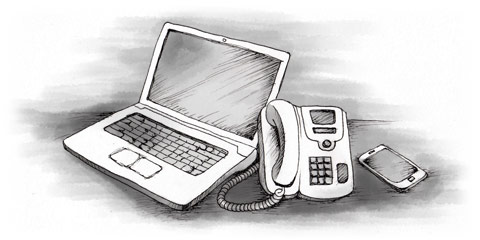Regardless of the carrier, you should expect to pay a flat rate between CAD$ 30 and CAD$ 45 for basic residential local phone service (excluding the corresponding taxes) and this will give you free unlimited local calls (within your area code).
If you have no credit references/history in Canada, you will probably be asked for a security deposit when requesting a residential phone service (depending on how much you use the phone, around CAD$ 200 - If you are not sure about the amount of money you will be spending on the phone, the amount of the deposit may be higher). Deposits are returned after a year of service, with interest added (around 3-6% annually depending on prevailing interest rates).
The following table contains a list of the major telecommunications companies in Canada indicating the services provided in the different Canadian Provinces.
- Bell Canada : (Ontario, Nova Scotia & Quebec): Landline, Long Distance, Wireless (CDMA 1X), VoIP, Internet, Satellite TV, IPTV
- Rogers Communications : (Ontario, Quebec, New Brunswick, Newfoundland): Wireless (GSM, GPRS), Cable TV, VoIP
- Fido / Microcell (Now Rogers) : (Ontario & Quebec): Wireless (GSM, GPRS)
- Telus : (Ontario, Quebec, British Columbia, Alberta): Wireless (PCS – 1X), Landline, Internet
- Virgin Mobile : (Ontario) Wireless (PCS)
- Shaw Communications : (Alberta, British Columbia) Satellite TV, Cable TV, Internet
- Cogeco : (Ontario, Quebec) Cable TV, Internet, VoIP
- VideoTron : (Quebec) Cable TV, VoIP, Internet
- Manitoba Telecomm Services MTS : (Manitoba) Landline, Wireless, VoIP, Internet
- SaskTel : (Saskatchewan) Landline Wireless, Internet, Satellite TV
- Aliant : (Nova Scotia, New Brunswick, PEI) Landline, Satellite TV, Wireless (CDMA 1X), IPTV
Long distance and International Service
Once you have chosen your local phone provider, you are free to choose a different carrier for long distance and international calls. Given the large variety of plans from the different providers, they are difficult to compare here. To work out what is the best deal for you, consider how much and where you will be calling and then shop around.
Long distance and international carriers include: BellCanada, Sprint Canada, Allstream, Primus, etc. If you know which countries/cities you will be calling the most, some companies may offer rates up to 80% off the maximum regulated amount per minute.
Many providers advertise on TV their discounted indirect phone access through seven-digit dialing prefixes (10-10-XYZ). You just dial the prefix before every call in order to get their rates. If you forget to dial the prefix, you would simply be billed at the normal carriers’ rates. Beware that most of these 10-10-XYZ services offer the discounts on the basis of conversations longer than 20 minutes. If you dial the 10-10XYZ to make a short long distance call, you may be paying a substantial premium.
VoIP is also available for long distance service and in some instances it may provide some significant savings. Beware that some VoIP providers will require a larger initial investment that may come in the way of extra routers, special phones, or a combination of both.
Finally, there is a variety of Long Distance and International phone cards that can be acquired at most convenience stores in major cities. The rates and features of these cards varies largely, however in some instances you may be saving up to 90% of the normal long distance rates.


